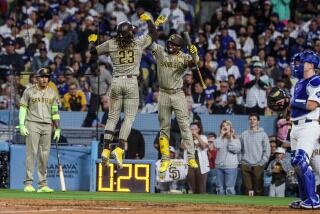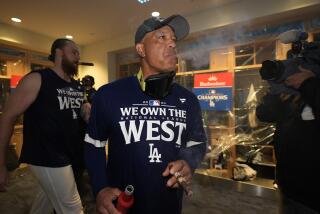Bowa Tries to Be Calming Influence . . . Really
- Share via
HOUSTON — It is March 28, the sixth inning of an exhibition game against the Angels. Padre catcher Benito Santiago attempts to travel from first to third base on a none-out wild pitch. Nice itinerary. He is thrown out by about 27 steps.
As he walks slowly back to the dugout, several thoughts fill his head. They are not thoughts about baserunning, wild pitches, or taking chances with none out.
They are thoughts such as, where is Larry Bowa, and does he have a bat in his hand?
Other players, who try not to look anywhere but straight ahead, are thinking the same thing. They’ve seen it before. They’ve felt it.
Their manager meeting somebody as they leave the field and stalking them to their seat. Their manager yelling so loud from his seat, his profanities are heard in the box seats. Bowa and embarrassment. Bowa and fear.
Santiago reaches the top of the dugout steps. Bowa is waiting for him at the bottom.
“Hey,” Bowa says, “good hustle.”
Bowa walks away. Speech over. Players speechless.
“I don’t know if everybody saw that, but some of us did,” pitcher Greg Booker said. “And believe me, it showed us something.”
Said first base coach Greg Riddoch: “Last year, that doesn’t happen. Last year, no telling what happens.”
Tonight at 5:35 in the Astrodome, as the Padres open their 20th season, Bowa the manager will open his second season hoping to make just that point.
This is not last year. Not for him, anyway.
He claims he has called off the curses. Ordered a retreat of the insults. Disbanded the spur-of-the-moment player evaluations (e.g., “So-and-so stunk tonight”).
Bowa will enter the season having declared a cease-fire with his temper.
“I’ve changed,” Bowa said, pausing. “A lot.”
Whether it will last past the first mind-blowing loss is unknown and, like the man himself, unpredictable. Only one thing is clear. If it doesn’t last, he won’t.
When looking to pinpoint a 1988 Padre Man on the Spot, look no further than Bowa.
“What I’m trying to do is very hard for me,” said Bowa early one recent spring morning, the first Padre out of the clubhouse as usual, sitting in his favorite spot, a folding chair next to the dugout. “But I realize I have to do it if I want to have a career as a manager. I don’t have any choice.”
Not just a career. How about another full season? Of such personality adjustments, many say his future with this club past mid-season depends on them.
When Bowa was rehired with a one-year contract last September, having proved himself as one of baseball’s top young strategists, President Chub Feeney tempered the excitement with this warning: “We’re very happy with his on-the-field performance. It’s the other stuff we have to work on.”
Just a month earlier, Feeney had privately scolded Bowa for getting thrown out of game in New York after extraneously arguing with the umpires, the same umpires Feeney used to boss as National League president.
It was not just umpires that bothered club officials. It was Bowa’s fights with players, including one near fisticuffs with outfielder Stanley Jefferson. It was his fights with clubhouse equipment, including bats (broken), tables (cleared), and balls (thrown).
It was his clubhouse meetings- turned-public floggings, where he would bring everybody together just to single out one. It was the ensuing public airing of his speeches during those meetings. It was his loss of voice, and loss of control.
Bowa’s dilemma, essentially, was this: Somebody forgot to tell him he was managing a different game than he played.
The brunt of his playing career was in the 1970s, a time where Bowa felt pride still ranked somewhere above money. If Bowa saw somebody needed a kick, they got kicked, and then they played harder the next time so it wouldn’t happen again.
What it took Bowa a year to discover was, many don’t play like that anymore.
“When you make a mental error, you know it,” second baseman Randy Ready said. “You don’t need somebody rubbing it in.”
Said Bowa: “I really didn’t know about today’s players. I was used to playing for Dallas Green (in Philadelphia), a guy who jumps in our faces even when we won, pointing out stuff we did wrong. It fired me up, and it got us a World Series win, and I thought that was how you were supposed to do it.
“Not anymore. These days you have to go with the flow. You have to push different buttons. You have to go give them credit for trying. It’s a new breed. Last year I didn’t know this, and made a ton of mistakes because of it.”
This winter, in working with writer Barry Bloom on their soon-to-be-released diary of a rookie manager entitled “Bleep,” Bowa relived all those mistakes. He claims he read the manuscript five times, each time opening his eyes a bit more.
For some, that would amount to an inner cleansing. For Bowa, it only left him feeling dirty, and vowing never to let certain things happen again.
“I realized some of the stuff that happened was my fault, that I was wrong,” Bowa said. “Many times I should have bit my tongue. I should have waited until the next day to say anything to anybody.
“You don’t realize what kind of person you sound like until you read yourself talking. I was very humbled.”
Throughout the six weeks of this spring training, it showed. As of tonight, Bowa has yet to call a clubhouse meeting. He has yet to rip a player in public. He has yet to break anything.
He had actually taken to public compliments. After one particularly awful spring training loss, he stood among the players as they ran sprints, shouting, “Good work, good effort, we’ll get them, hang with them.”
“Did you see that?” Riddoch asked. “Tell me the man is not trying.”
The first time he talked with Santiago about the baserunning blunder? Much later, when they found themselves together in a corner of the clubhouse.
Bowa has even tested a cooling-off period with the media. During spring games in the Phoenix area, instead of talking to reporters immediately after the game in the dugout, he would say nothing until driving back to the team’s hotel, sometimes as much as a 45-minute lapse.
“Everybody thought I did it to beat traffic, no way,” Bowa said. “I did it to see if my comments would change after I cooled off. And they did. I wasn’t as tough on guys. I had a chance to think about it.
“Last year I was too spontaneous, too honest. It was good for the newspapers, but not good for the team. This year I’m going to try to not even bring up a guy’s name. I’ll just say, ‘The pitching was bad’ and you can figure out who I’m talking about.”
Although big-league etiquette discourages Bowa from keeping reporters waiting 45 minutes after regular season games, club officials have said that a three-to-four minute cooling-off period is possible. If he had his druthers, Bowa would actually take all night. He said this spring he has finally learned to sleep on things.
“I tried it, and most of the time, when I woke up, what seemed so important wasn’t so important anymore,” he said. “I need to keep quiet about a guy at least until the next morning. If I’m still mad, then we talk.”
The team has noticed all these changes. Bowa probably can’t tell, because he isn’t even walking through the clubhouse as much as he used to--”It’s their domain,” he said. But they’ve noticed.
“He has shown more patience,” said Booker, the only current Padre who was with Bowa throughout his 1986 managerial debut at triple-A Las Vegas. “Before, he wanted effort and results. Now, he’ll take 100% effort and let the results take care of themselves.”
“Before,” said infielder Tim Flannery, “it was his way or the highway. Now he knows what guys to push, and what guys to back off of.
“He’s managing like he wants to keep managing the rest of his baseball career.”
He does, which is why it’s a good thing for him that management has also noticed.
“It was a much more relaxed camp,” said General Manager Jack McKeon, who stood firmly by Bowa’s side during last year’s storms. “It’s all been a matter of Larry knowing his players better, and his players knowing him better.
“What we expect out of Larry is no more than you’d expect out of any manager--to get the best out of what he’s got. That’s it.”
Not that Bowa has won any battles or best friends yet. A temper is not like an overcoat. To remove it sometimes you have to peel and scrape. It can be slow and painful.
“I’ve still got a long way to go, much to learn,” he said. “For example, I still say things in the dugout I shouldn’t say, I get too involved with every pitch and forget about who I’m sitting with. I’ll see my pitcher throw a ball and say ‘Geeeeeez’ too loud and all of a sudden, everybody is saying I’ve had another snap.
Not that Bowa doesn’t still get mad, mind you. Ask his wife, Sheena.
“A couple of times this spring, I got home so frustrated, I unleased all of my complaints on her,” Bowa said. “She was good about it, though. She said, ‘Better me than the players.’ I guess she’s right.”
In the clubhouse last week, smiling first baseman John Kruk came up to Bowa and asked, “What’s the matter, how come you haven’t snapped yet, not one snap all spring?”
Responded Bowa, “Sorry, man. But I tried that.”
Padre Notes
Tonight’s batting order, as expected: Stanley Jefferson (CF), Tony Gwynn (RF), Keith Moreland (LF), John Kruk (1B), Randy Ready (2B), Benito Santiago (C), Chris Brown (3B), Garry Templeton (SS) and Ed Whitson (P). . . . As a sign of things to come, that lineup will likely change Wednesday, when the lefthanded-hitting Kruk will likely be benched against good left-hander Bob Knepper. In Kruk’s spot will be right-handed hitting Carmelo Martinez, perhaps starting a platooning trend that only Kruk, with a better performance against left-handed pitchers when he gets a chance, can stop. Last year Kruk hit .339 against right-handers and .255 with only four of his 20 homers against lefties.
More to Read
Go beyond the scoreboard
Get the latest on L.A.'s teams in the daily Sports Report newsletter.
You may occasionally receive promotional content from the Los Angeles Times.







